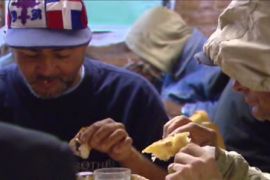Longer lines at New York food banks
As cost of living rises, more Americans are finding it difficult to afford food.

In early 2008, food riots and protests shook the world as the price of basic commodities spiralled out of control and became beyond the means of millions of people who could no longer afford to buy rice, bread and other staple foodstuffs.
However, such food insecurity has not been restricted to developing and under-developed nations, but has affected millions in wealthier western nations as well.
In the US, for example, food banks across New York City have reported an increase in the number of people seeking assistance,with some reporting an increase of more than 25 per cent just in the past year.
Al Jazeera’s Cath Turner reports from New York City where lines at food banks in neighbourhoods like the Bronx, with a large low-income population, now seem endless.
Food security in the US has been steadily worsening, with millions of Americans having to rely on charities and aid organisations for their next meal.
The cost of living has risen over the past few years as housing, food and transportation become more expensive. But wages and fixed incomes, such as social security and other welfare benefits, have remained at the same level.
For many people in New York City, the commercial heart of the US, there is not much money left for food after paying the rent or mortgage, and other basic necessities.
Between 2003 and 2008, the number of people in New York City who had difficulty affording food doubled from two to four million.
The Food Bank of New York City distributes food to 800 pantries and food kitchens across the city’s five boroughs.
Ninety-three percent of the pantries have reported an increase in first-time customers coming through their doors. And they are seeing all types of people come to them for help – families, women with children, the elderly, the employed and the unemployed.
Financially-strapped generation
Aine Duggan, the vice-president of research and education for the Food Bank, says the stereotype of only poor, homeless people using food kitchens is not true any more.
Seventy-five percent of their customers are living in rented accommodations, but they simply do not have enough money to eat.
The Food Bank is very worried about one particular demographic – baby boomers who are now entering retirement.
One in four people waiting in line at their soup kitchens is over the age of 65.
Duggan says they are part of a generation that has no financial savings to fall back on in times of emergency. Their regular income will end once they retire, and they will be forced to rely on charities to eat.
Government policies and attitudes are partly to blame for the current poverty levels, Duggan says.
She calls last year’s multi-billion dollar bank bailouts by the US government an “eye-opener” because it showed that when Washington is willing, help can come very quickly.
Poverty bailout
The Food Bank is concerned that hunger will be forgotten soon, now that the government is starting to talk about the economy recovering.
“Very often, once there’s a declaration that the recession is over, sympathy for people who are most in need tends to dissipate,” Duggan says.
“And there’s a sense that people should really be working hard and getting back on their feet, the recession is over, there’s no more excuse and that if you are in need, it must be because you’re lazy, and that if you would only just pull yourself up by the bootstraps you would be all right and so would your family.
“Well, most of the people coming to us, they can’t afford bootstraps or boots and they can’t afford food either.”
Struggle to survive
Part of the Solution – also known as POTS – is a soup kitchen in the Bronx borough.
People in need come to POTS from far away and are willing to wait in line for hours because it is famous for its friendly and welcoming attitude.
POTS serves meals twice a day to about 400 people a day and also provides other free services, such as legal advice, haircuts and a place to shower.
Sister Mary Alice is the executive director at POTS and has been working there for 10 years.
She knows just about everyone who comes in for food and says the personal stories she hears are heartbreaking and beautiful at the same time.
“I’m in awe of these people who walk through the doors, that can survive this system that they’re in,” she says.
“I mean, to live on a bench, day after day, night after night, I don’t care what your addiction is, I don’t care what your issues are, how do you stay alive? How do you survive?”
But with winter just a few weeks away, survival is about to get a lot harder for those in need in the US.